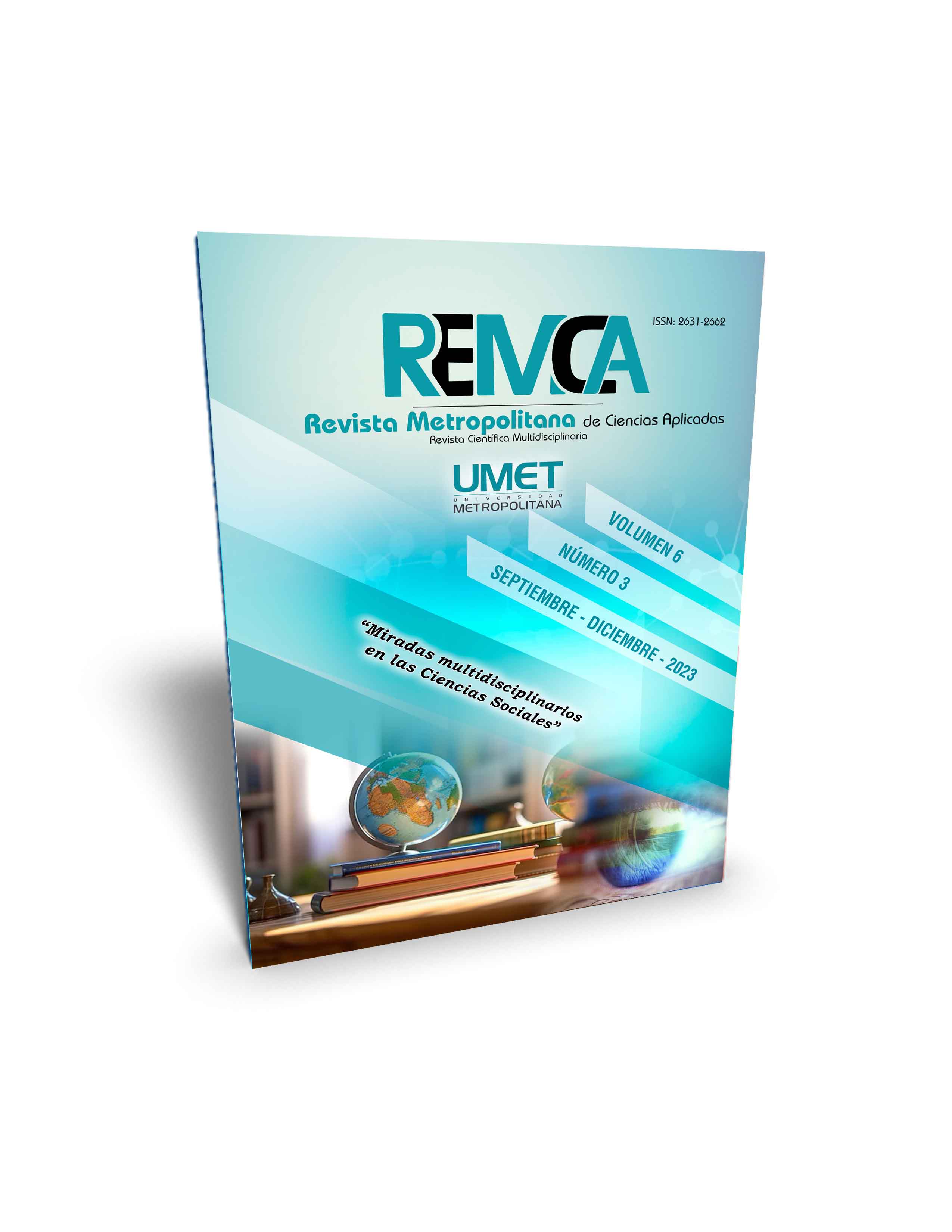Aspects that intervene in the low academic performance and family dysfunctionality of the students in 4th – 5th semesters of the Health Promotion career of the Escuela Superior Politécnica de Chimborazo
DOI:
https://doi.org/10.62452/w6619523Keywords:
Family, education, academic performance, discrimination, family environmentAbstract
Family dysfunction can have a significant impact on the academic performance of students of the Health Promotion Career, without a doubt; emotional and financial support, domestic violence, substance abuse and other family problems can influence students and therefore their studies causing disinterest in education; therefore, the research proposed as an objective to determine the incidence of family dysfunction and its impact on low academic performance in the period April - August 2022. A descriptive and transversal approach was used as methodology, without experimentation, with a sample of 60 students, to collect data, the survey was used as a technique, through the questionnaire instrument in the Google Forms platform, promoting the participation of parents, students and teachers; the results showed that 60% of the students have a good communication and relationship with their parents, the same that in a cross of variables, highlights that 100% of the students have good academic performance, while 40% argue a poor or no relationship with their family, which affects low academic performance. In conclusion, it was determined that most of the interviewees have a good academic performance, however, a significant percentage have low academic performance, they also indicate poor communication at home, there is not an adequate family environment, they come from dysfunctional families, they indicate that they have suffered verbal and psychological mistreatment.
Downloads
References
Albán, J., & Calero, J. L. (2017). El rendimiento académico: aproximación necesaria a un problema pedagógico actual. Revista Conrado, 13(58), 213-220.
Aznar, I., Cáceres, M. P., & Hinojo, F. J. (2018). Estudio de la Violencia y Conflictividad Escolar en las Aulas de Educación Primaria a través de un Cuestionario de Clima de Clase: El Caso de las Provincias de Córdoba y Granada. REICE. Revista Iberoamericana Sobre Calidad, Eficacia Y Cambio En Educación, 5(1).
Carreras, A. (2016). Apuntes. Roles, reglas y mitos familiares. https://www.avntf-evntf.com/wp-content/uploads/2016/06/Apuntes-Roles-ymitos
Covadonga, M. (2011). Factores familiares vinculados al bajo rendimiento. Revista Complutense de Educación, 1, 81-113.
Gómez Sánchez, D., Rosalba Oviedo, M., & Martínez López, E. (2011). Factores que influyen en el rendimiento académico del estudiante universitario. Educacion y Humanidades, 5(2).
Lackwood Bustillo, I., Ruiz Rivera, Z., & Valdivia, V. (2008). Factores que influyen en el proceso de Enseñanza aprendizaje en el área español como segunda lengua, en quinto y sexto grado en la modalidad de multigrado en la escuela Bilingüe: “Enmanuel”. Año 2007 – 2008, Rosita, RAAN. Ciencia E Interculturalidad, 2(2), 104–124.
Lastre, K., Salcedo, O., Segovia, E. (2020). Incidencia de la Disfuncionalidad Familiar en el Desempeño Académico de Estudiantes de Secundaria. Revista Espacios, 41(20).
López Caceres, E. (2010). La evaluación externa como instrumento de mejora para la práctica docente. Educacion en extrema madrura, 1-10. https://xdoc.mx/documents/revista-completa-anpe-extremadura-5d9f90f5d3d6e
López, P., Pico, A., Mendoza, E., & Del Salto, M. (2015). Causas y Consecuencias del estrés académico. Facultad de Trabajo Social de la Universidad Laica “Eloy Alfaro” de Manabí, Manta, Ecuador. Revista Científica Scielo MEDISAN, 19(9).
Mora Aguilera, D. A. (2016). Influencia de la disfuncionalidad familiar en el aprendizaje significativo de los estudiantes del grado quinto del IED Agustín Fernández sede B jornada tarde. (Tesis de maestría). Universidad de La Sabana.
Navarro, E. (2003). El Rendimiento Academico. REICE - Revista Electrónica Iberoamericana sobre Calidad, Eficacia y Cambio en Educación 2003, 1(2).
Nicuesa, M. (2013). Formación y Estudios. https://www.formacionyestudios.com/cuatro-causas-del-bajo-rendimiento-academico-en-la-etapa-universitaria.html
Padrón, C., & García, T. (2018). Homicidio y Disfuncionalidad Familiar. Revista Cubana de Medicina General Integral, 34(2).
Padua, L. (2019). Factores Individuales y Familiares Asociados al Bajo Rendimiento Académico en Estudiantes Universitarios. Revista Mexicana de Investigación Educativa, 24(80), 173-195.
Palacio, O., Maceo Palacio, A., Varón Blanco, Y., Maceo Palacio, M., & Peralta Roblejo, Y. (2016). Estrés académico: causas y consecuencias. MULTIMED, 17(2).
Pino, P., García-Herrera, D., Erazo, J., & Narvaez, I. (2020). Las TIC como mediadoras en el proceso enseñanza – aprendizaje durante la pandemia del COVID-19. Koinonia, 5(1), 121-142.
Rodríguez, I., & Madrigal, A. (2016) Rendimiento académico y estrategias de aprendizaje. Universidad Autónoma del Estado de México.
Sánchez Seisdedos, P. (2017). Cerebro & Neurociencia. https://blog.cognifit.com/es/conducta/
Valverde, G. (2018). Hogares dinsfuncionales y su incidencia en el desarrollo socio afectivo de los escolares. Revista Psicología UNEMI, 3(4), 8-23.
Velázquez, R. (2018). CAPEC ZITÁCUARO. https://capep9.jimdo.com/orientaciones-para-docentes/estrategias-para-manejar-los- problemas-de-conducta-en-el-aula/
Downloads
Published
Issue
Section
License
Copyright (c) 2023 Julio Enrique Usca-Carrillo, Andrés Ernesto Cañizares-Medina, Nancy Yolanda Fernández-Aucapiña (Autor/a)

This work is licensed under a Creative Commons Attribution-NonCommercial-ShareAlike 4.0 International License.
Authors who publish in Revista Metropolitana de Ciencias Aplicadas (REMCA), agree to the following terms:
1. Copyright
Authors retain unrestricted copyright to their work. Authors grant the journal the right of first publication. To this end, they assign the journal non-exclusive exploitation rights (reproduction, distribution, public communication, and transformation). Authors may enter into additional agreements for the non-exclusive distribution of the version of the work published in the journal, provided that acknowledgment of its initial publication in this journal is given.
© The authors.
2. License
The articles are published in the journal under the Creative Commons Attribution-NonCommercial-ShareAlike 4.0 International License (CC BY-NC-SA 4.0). The terms can be found at: https://creativecommons.org/licenses/by-nc-sa/4.0/deed.en
This license allows:
- Sharing: Copying and redistributing the material in any medium or format.
- Adapting: Remixing, transforming, and building upon the material.
Under the following terms:
- Attribution: You must give appropriate credit, provide a link to the license, and indicate if any changes were made. You may do this in any reasonable manner, but not in any way that suggests the licensor endorses or sponsors your use.
- NonCommercial: You may not use the material for commercial purposes.
- ShareAlike: If you remix, transform, or build upon the material, you must distribute your creation under the same license as the original work.
There are no additional restrictions. You may not apply legal terms or technological measures that legally restrict others from doing anything the license permits.




